Yo gamers! Are you questioning whether “do you need a CPU cooler for a gaming PC?” Are you tired of your PC randomly shutting down in the middle of an intense gaming session? Or maybe you’re hearing strange noises coming from your computer while you play? Well, my friend, you might need a CPU cooler!
But, you might be asking, what is a CPU cooler? A CPU cooler is a device that helps keep your computer’s central processing unit (CPU) at a safe temperature while you game. The CPU is the heart of your PC, and it generates a lot of heat while it works. And if it gets too hot, it can cause serious problems.
That’s why having a CPU cooler is essential, especially if you’re a gamer. It will keep your PC running smoothly and prevent those annoying shutdowns or noise disruptions. In this post, we’ll explore why you need a CPU cooler for gaming, the different types available, and how to choose the right one for your setup. So, let’s dive in!
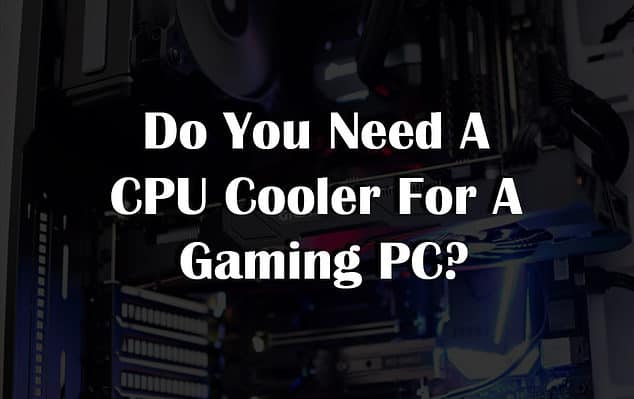
Do you need a CPU cooler for a gaming PC?
Yes, absolutely! A CPU cooler is an essential component for any serious gaming PC. Without it, your system can easily overheat, causing lag, crashes, and even permanent damage. Investing in a good CPU cooler is a no-brainer, as it will improve your gaming performance, prevent overheating issues, and keep your system running smoothly for years to come. So, whether you’re a casual or competitive gamer, make sure you’ve got a cooler that’s up for the task!
Welcome to the world of CPU coolers, fellow gamers! In this section, we’ll cover the basics of what a CPU cooler is and why it’s crucial for a gaming PC. So, buckle up and get ready to upgrade your PC knowledge!
1. The Importance of a CPU Cooler for Gaming
As a gamer, you know how important it is to have a smooth and seamless gaming experience. But, have you ever considered the role that temperature plays in this experience? High temperatures during intense gaming sessions can lead to major performance issues, potentially ruining your gaming experience. In this section, we’ll dive into the why and how of keeping your gaming PC cool.
A. High-temperature issues while gaming
Gaming requires your PC to work at peak performance for extended periods of time. This can result in high temperatures, which can lead to various issues such as system crashes, slowdowns, and even permanent damage to components. Don’t let overheating ruin your gaming sessions, keep your cool and ensure a smooth experience.
B. Effects of overheating on performance
Overheating not only causes inconvenience but can also significantly impact the performance of your gaming PC. When your CPU reaches high temperatures, it can throttle its performance, slowing down the processor to prevent further damage. This can result in a decrease in frame rate, making games less enjoyable and less competitive.
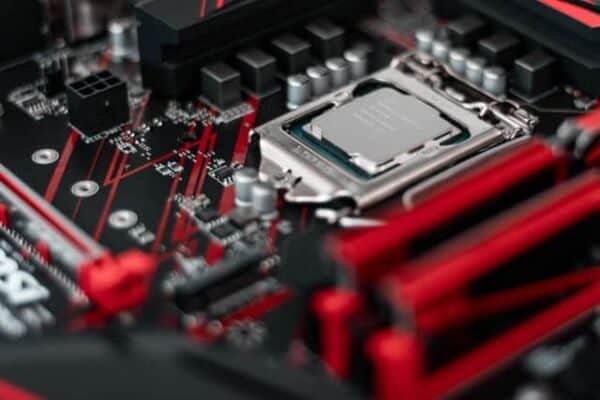
C. The role of a CPU cooler in preventing overheating
The solution to this problem is simple: a CPU cooler. A cooler helps to regulate the temperature of your CPU, keeping it within safe limits, even during intense gaming sessions. This not only ensures a smooth gaming experience but also protects your PC from damage, ensuring that it continues to perform at its best for years to come.
As a gamer, you don’t want to be held back by high temperatures. Investing in a CPU cooler can help ensure that you enjoy the best possible gaming experience, free from performance issues caused by overheating. Check out our article How to Choose A Gaming Motherboard? to understand the compatibility.
2. An In-Depth Look at CPU Coolers for Gamers
When it comes to keeping your gaming PC cool, there are two main options to choose from: air coolers and liquid coolers. In this section, we’ll take a closer look at the pros and cons of each type of cooler to help you determine which is the best fit for your gaming setup.
A. Air Cooler
The Classic Cooling Solution Air coolers have been around for a while and are a popular choice among gamers. They work by using a heat sink that’s connected to a fan. The heat sink absorbs heat from the CPU and the fan blows air over the heat sink to dissipate the heat. Air coolers are simple to install, low-maintenance, and more affordable than liquid coolers. However, they can be bulky and take up more space in your case, and they can also be louder than liquid coolers.
B. Liquid Cooler
The High-Performance Solution Liquid coolers, on the other hand, use a water block that’s connected to a pump, radiator, and fans. The water block absorbs heat from the CPU and the pump circulates the water to the radiator, where it’s cooled by the fans. Liquid coolers are more efficient than air coolers and can cool your CPU more effectively, even under heavy loads. They’re also less bulky than air coolers and can be quieter, making them a good choice for those who value a quiet gaming environment. However, they’re more expensive and require regular maintenance.
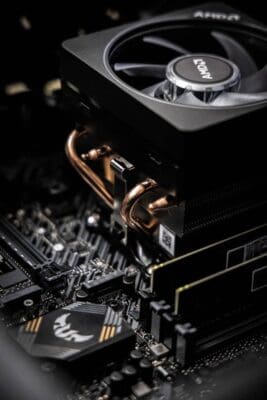
C. Comparison of Air and Liquid Coolers
Performance vs. Price When it comes to performance, liquid coolers have the edge over air coolers, especially under heavy loads. However, air coolers are more affordable and simpler to install and maintain. Ultimately, the choice between an air cooler and a liquid cooler comes down to your budget and what you value most: performance or affordability.
Both air coolers and liquid coolers have their pros and cons, and the choice between them ultimately depends on your budget and what you’re looking for in a cooling solution. Whether you’re a hardcore gamer looking for maximum performance or a casual gamer who values affordability and ease of maintenance, there’s a CPU cooler out there that’s perfect for you.
3. Selecting the Ultimate Cooling Companion for Your Gaming Rig
Are you in the market for a new CPU cooler but don’t know where to start? Look no further, as we will guide you in choosing the right one for your gaming setup.
A. Compatibility with Your CPU
Before purchasing a cooler, make sure it is compatible with your CPU. Check the socket type and ensure that the cooler is designed for your specific model. No one wants to buy a cooler only to find out it doesn’t fit.
B. Size Matters
Size is another crucial factor to consider. Make sure to measure your PC case to ensure that the cooler you choose will fit. You don’t want a cooler that is too big or too small for your setup. The last thing you want is for it to get in the way of other components or not properly cool your CPU.
C. Keep it Quiet
Gamers require focus and concentration, and the last thing you want is to be distracted by a noisy CPU cooler. Check the decibel level of the cooler to make sure it’s not too loud for your taste.
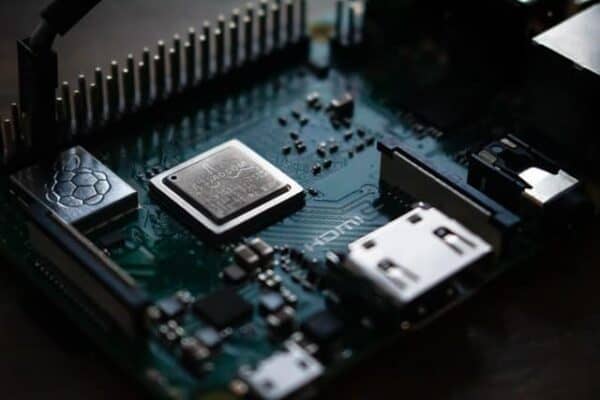
D. Performance vs. Price
Price and performance should also be taken into consideration when choosing a CPU cooler. Consider your budget and what you’re willing to spend. A high-end cooler may have better performance, but it also comes with a higher price tag. Balance your budget with your performance needs to find the right cooler for you. Check out our article on How to Choose a Gaming PC? if you are looking to buy a gaming rig.
Choosing the right CPU cooler for your gaming setup involves considering compatibility, size, noise level, and price/performance. Keep these factors in mind as you select the ultimate cooling companion for your gaming rig.
Frequently Asked Questions for Selecting the Ultimate Cooling Companion for Your Gaming Rig
Q: Why do I need a CPU cooler for gaming?
A: High temperatures during intense gaming sessions can cause performance issues and even permanent damage to your CPU. A CPU cooler helps prevent overheating by dissipating heat away from the CPU, ensuring stable performance and prolonging the life of your gaming rig.
Q: What are the different types of CPU coolers available?
A: There are two main types of CPU coolers – air coolers and liquid coolers. Air coolers use heat sinks and fans to cool the CPU, while liquid coolers use a water-based solution to transfer heat away from the CPU. Both have their pros and cons, so it’s important to compare the performance and price to determine the best one for your setup.
Q: How do I ensure compatibility with my CPU?
A: Before purchasing a CPU cooler, make sure to check the socket type and compatibility with your specific CPU model. Don’t forget to double-check to avoid any potential compatibility issues.
Q: How does the size of the cooler affect my gaming setup?
A: Size is an important factor to consider when choosing a CPU cooler. Make sure to measure your PC case to ensure that the cooler you choose will fit. A cooler that is too big or too small can get in the way of other components or not properly cool your CPU, causing performance issues.
Q: Is noise level a factor to consider when choosing a CPU cooler?
A: Absolutely! Gamers require focus and concentration, and a noisy CPU cooler can be a distraction. Check the decibel level of the cooler to make sure it’s not too loud for your taste.
Q: What should I consider when comparing the price and performance of a CPU cooler?
A: Balancing your budget with your performance needs is key when choosing a CPU cooler. A high-end cooler may have better performance, but it also comes with a higher price tag. Consider what you’re willing to spend and what level of performance you require to find the right cooler for you.
Check out our article What Is A Good Internet Speed For Gaming And Streaming? if you have internet issues.
Conclusions and Recommendations
A. Summarizing the Heat Battle
The importance of having a CPU cooler for a gaming PC cannot be overstated. As gamers, we all know the frustration of playing a game that suddenly crashes or lags due to overheating. With a CPU cooler, you ensure that your system remains cool, even during long gaming sessions, and performs at its best.
B. Choosing the Right Weapon for the Job
When selecting a CPU cooler, it’s essential to consider your budget, performance needs, and noise level preferences. If you’re on a tight budget, an air cooler is a good option. For more demanding systems, a liquid cooler is a way to go. Regardless of the type of cooler you choose, make sure it’s compatible with your CPU, fits in your PC case, and provides the performance and noise level you desire.
C. The Final Thoughts on Cooling Your Gaming Rig
With a CPU cooler, you’ll experience smoother and more reliable gaming performance. No more lag crashes, or overheating issues. So, take the time to find the right cooler for your system and get ready to take your gaming experience to the next level!
In conclusion, investing in a CPU cooler is a must for any serious gamer looking to improve their system’s performance and ensure a smooth and enjoyable gaming experience. With the right cooler, you’ll be able to enjoy your games without worrying about your system overheating or crashing. Happy gaming!
